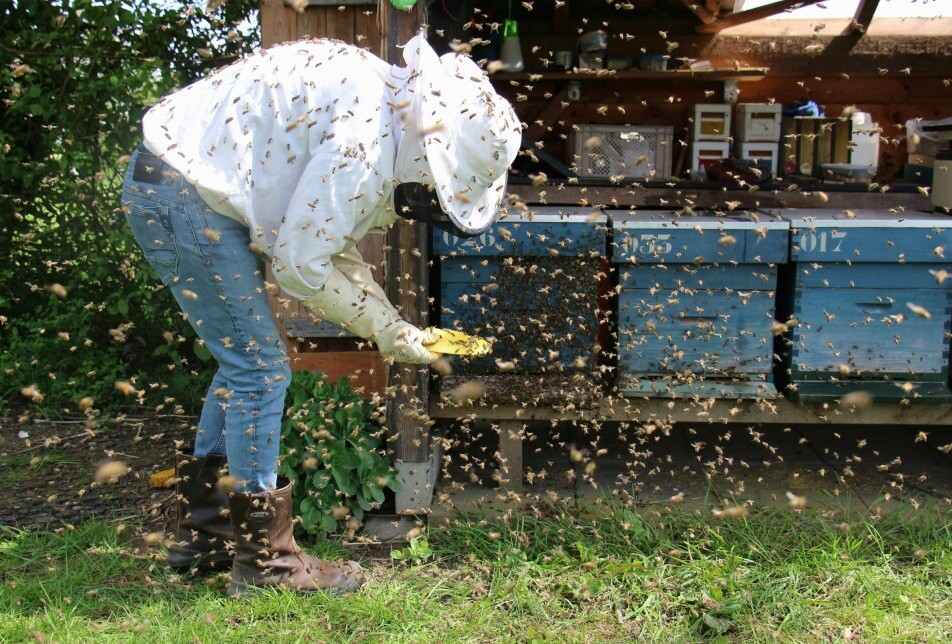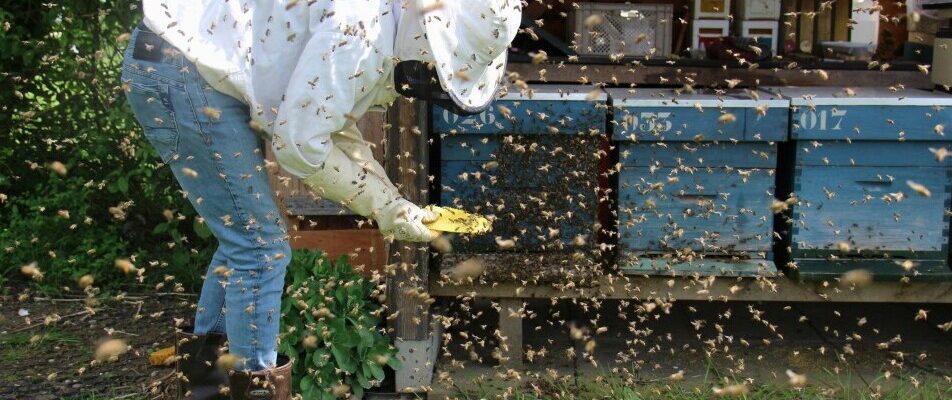Beekeeping ain’t just about tending hives and harvesting honey. It’s kind of like managing a small business, and just like any business, keeping accurate records is a big deal. Now, some might think jotting down hive inspections and honey yields is a bit of a chore, but trust me, having detailed records can make all the difference.
Imagine you’re trying to sort out which of your hives is the superstar and which one needs a little pep talk. Without records, you’d just be winging it, and that’s not cool when it comes to bee health. Those little details about hive behavior, queen performance, and honey production trends? Yeah, they’re gold when making the best calls for your apiary.
Being organized with beekeeping records doesn’t mean burying yourself in paperwork. Nope, it’s about knowing what’s happened in the past so you can make smarter decisions in the future. Spotting patterns, like a drop in honey yield or frequent swarming, gets way easier when you have proper records. It keeps you on your toes and ready to tackle any hiccups quickly.
Think of records as your beekeeping timeline. They tell you how things have changed over time and help you stay ahead of issues before they become big problems. Plus, when you need advice or are chatting with fellow beekeepers, sharing your experiences becomes so much easier when you’ve got everything documented. Putting in the effort with record-keeping now saves a lot of headaches down the road.
So, next time you’re out there with your bees, remember that keeping track of what’s happening might just give you the edge you need. It’s all about building a stronger, healthier, and happier bee colony, and records play a starring role in that adventure.

Common Challenges in Maintaining Beekeeping Records
Getting into the habit of keeping beekeeping records can be tricky. There’s a bunch of stuff that makes it challenging, and I’m here to break it down so you’re not left scratching your head.
Ever feel like collecting and organizing data is overwhelming? You’re not alone. Jumping into beekeeping without a system can make it seem like you’re swimming in data with no land in sight. Decisions about what to track and how to store it can be daunting initially.
Sometimes, keeping track of things slips through the cracks simply because life gets busy. Beekeeping is hands-on and time-consuming, and when your to-do list is a mile long, jotting down hive info might not always top the list.
Another common roadblock is finding a storage method that works. It feels like those notes disappear into a black hole if you’re not storing them properly or using a method that’s easy to stick with. In the digital age, going old-school with paper records can be risky if they’re not organized. Switching to digital might be the move for keeping everything tidy and accessible.

Awareness is key. Many folks just don’t realize how crucial good record-keeping is actually from the get-go. It’s pretty common to hear about beekeepers who’ve stumbled in record-keeping simply because they didn’t understand the impact it had on their bees’ health and productivity.
Getting past these challenges means finding what works for you. Streamlining the process with practical solutions like simple spreadsheets, utilizing apps tailored for beekeeping, or even good old notepads can make life way easier. Trying different approaches until you find what’s just right for you and your bees is worth the effort.
Impact of Failing to Maintain Proper Records on Bee Health
Not keeping proper records in beekeeping can have serious downsides, and it’s the bees that feel the hit first. Diseases can sneak up on you when there’s no trail of past treatments or hive conditions to follow. Think of it like running blindfolded—you won’t see those red flags or patterns that signal trouble until it’s too late.
Accurate records tell tales of hive behavior and performance. Without them, it’s easy to miss the subtle changes in the hive dynamics. These changes could spell issues like swarming behavior or nutritional deficiencies. Records provide insights that help in understanding what’s normal for your hives and what’s out of whack.

The risk of pest infestations creeps up when you don’t have records to fall back on. You can’t track when treatments were last applied or how effective they were, leaving your bees prone to varroa mites and other pests. It’s like leaving your front door open with ‘welcome’ signs for troublemakers.
Over time, the hit from spotty records can ripple through the bee population. If one hive falls ill and records are not there to guide action, the problem can spread. Healthy colonies build from informed management, making record-keeping an unsung hero of hive wellness and success.
Taking notes about what’s happening with your bees isn’t just for today—it’s your backup plan for unforeseen issues down the line. Detailed records offer a complete picture, letting you make tweaks and adjustments to improve hive success consistently. By knowing precisely what’s happened before, you’re setting up a brighter, buzzier future for your bees.
Overcoming Record-Keeping Challenges: Tools and Strategies
When it comes to beekeeping, beating the challenges of record-keeping is totally doable with the right tools. Going digital might sound intimidating, but trust me, it’s a game changer. There are apps out there specifically built for beekeepers, making it super convenient to log data right from the field.
Creating a system that works for you is key. Start with simple tools like spreadsheets, or dive into apps that offer templates designed with beekeeping in mind. Customizing these templates to fit your specific needs is a great way to streamline the process and keep everything relevant.

Smartphone apps can be a lifesaver, giving you real-time access to your records wherever you are. Whether you’re out in the hive or relaxing at home, having all your data at your fingertips makes managing your hives so much easier and more efficient.
Some beekeepers find carrying a small notepad handy. It’s a classic approach but can still be effective when paired with transferring notes into a digital format later. It keeps things simple while ensuring you don’t miss logging any important details right there on the spot.
Experimenting with different methods until you find the perfect groove is totally worth it. Once you’ve nailed down your go-to approach, keeping track of everything becomes second nature. Embracing these strategies and tools will definitely take the hassle out of record-keeping, turning it into a smooth and integral part of your beekeeping routine.
Transforming Beekeeping through Better Record-Keeping
Keeping thorough records goes beyond just jotting down numbers and dates; it’s about empowering yourself as a beekeeper. Each entry tells a story about your hives, offering valuable insights that can lead to healthier bees and more successful honey harvests.
It’s clear that diligent record-keeping improves outcomes and builds confidence in managing your apiary. By learning from past experiences, both good and bad, you gain invaluable knowledge that aids in making strategic decisions about hive management.
The beekeeping community thrives on sharing knowledge, and having reliable records enhances that exchange. You can contribute to collective best practices within the community, fostering growth and learning for everyone involved.

Getting into the groove of regular record-keeping not only helps your own practices but also supports the broader goal of sustainable beekeeping. Better beekeeping means healthier bee populations, which is a win for everyone, especially our little pollinator pals.
Stay committed to learning and adapting, because the world of beekeeping is always evolving. With strong record-keeping as your foundation, you’re well on your way to creating a successful bee-friendly environment.

2 comments on “Failing To Keep Proper Beekeeping Records”
DroGodina
February 11, 2025 at 2:51 am-I think that beekeeping is no joke; you cannot lose ANY of them.
-Based off of what I’ve read here, also, it seems to me that it is not the type of job that needs to be overly-complicated, either; bees are bees and they are not to be messed with.
-Always keep your focus on safety and time; deal with them as urgently as can be, then remember each step that was taken along the way.
-Best,
ALEJANDRO G.
Randi
February 15, 2025 at 7:56 pmThanks for sharing your thoughts, Alejandro! You’re absolutely right; beekeeping requires focus, patience, and a commitment to safety. While bees have been keeping themselves in check for millions of years, modern beekeeping has definitely become more complicated due to challenges like Varroa mites and Colony Collapse Disorder (CCD). These issues weren’t on beekeepers’ radars decades ago, but today, they’re major threats to hive survival.
That’s why keeping thorough records (as mentioned in the article) is so important! Tracking hive health, treatments, and seasonal changes helps beekeepers stay ahead of potential problems before they spiral out of control. Bees may be resilient, but with all the modern-day obstacles they face, they need beekeepers to be just as diligent.